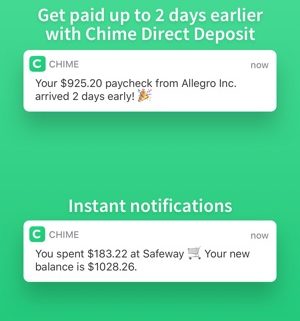Welcome to our site! Our editors have been covering the credit and debit card space for a total of 30+ years and we are proud to have been featured by the Wall Street Journal, CNN, etc. Your input is invaluable and we’d love to have your opinion regarding tips on how to best use a prepaid debit card (see below) – this site is powered by you!

Chime is a new Visa card that is amazingly free (unless you use the card outside of their large ATM network). This is best alternative to a prepaid card that we’ve seen in 5+ years and offers all of the benefits of traditional bank account.
It’s a Visa card and has a lot less fees than the typical prepaid debit card. Also, people with poor credit can apply too as there is no credit check. Chime can be managed entirely from your smartphone. No overdraft fees. No minimum balance. No Chex Sytems. No monthly service fees. No transfer fees. Over 38,000 fee-free ATMs, plus 30,000+ cash-back locations.
And for a limited time, earn a Cash referral bonus of $50 when you tell your friends and family members about Chime and they sign up (and they’ll earn $50 too)- details within the app after you apply! Click for more info.- you can apply online in just 2 mins with no obligation. Start by simply entering your email address and clicking “Get Started”– over 3 million customers couldn’t be wrong. 🙂 (Referral Link)
Prepaid debit cards are big business in the United States. According to Time magazine, consumers used them for (http://business.time.com/2013/08/01/prepaid-debit-cards-a-few-good-ones-to-consider-and-several-to-avoid) $77 billion worth of transactions in 2012. That’s a lot of swiping.
We all know about using them to pay for lunch or a pair of shoes. But have you ever thought about a prepaid card for. Following are some tips on creative ways you can use a prepaid debit card (Visa or MasterCard).
1. A door prize. You want lots of butts in the seats at the community cleanup or the first PTA gathering of the year? Advertise that a $50 prepaid debit card (or a couple of $25 ones) will be given away. Advertise it extensively.
Sure, it would be nice if people would attend such things without coaxing, but be realistic: If someone’s on the fence about attending (“Do I want to get up that early on a Saturday?/Be out that late on a school night?”) then the chance of winning might tip them over into Do The Right Thing territory.
2. An employee incentive. Whether it’s for putting (usable) ideas in the suggestion box or for making it through the holiday crush without losing their minds, your workers might appreciate the chance to get a little something extra.
Do it through a random drawing or as an out-and-out prize for a really smart suggestion. (Note: These are considered taxable income, according to the Internal Revenue Service. But they’re still fun to get.) On a related note, please note that Pex and Bento offer employee prepaid cards for small to medium sized businesses.
3. Help to a relative/friend in need. Sometimes handing over cash feels weird. Giving a prepaid card lets the person you love get what he needs: medicine, a bag of groceries, a tank of gas. Better yet: Slip it under the person’s door or mail it anonymously.
4. Moving expenses. Donna Freedman, who blogs at Surviving and Thriving (http://www.donnafreedman.com)
5. Kid travel gift. If your pre adolescent or teen is heading cross-country to visit his grandparents or to spend the summer with the noncustodial parent, a prepaid card will let him buy his own snacks and incidentals.
6. Blog giveaway. Want to build subscriber loyalty and get the attention of additional readers? Have a monthly giveaway – and every so often, make it a prepaid debit card. “This is something that we definitely plan on doing for our readers of our website and Facebook page.
With our website name talking specifically about prepaid cards, it just makes sense,” says Shane Tripcony, co-founder of BestPrepaidDebitCards.com. Regular gift cards are popular, too, but not everyone drinks coffee or shops at Target, whereas a prepaid card is good just about anywhere. Heck, I wish I could win one.
7. New grad gift. It can be tough to guess the needs/desires of an 18 or 22-year-old. A prepaid gift card means not just buying power, but choice. It’s up to him whether he spends at a grocery store or at The Gap.
8. Tax refund. The major tax preparers let you have the option of a refund via prepaid debit card. You’ll want to keep a close eye on the fees, but if you’re unbanked or underbanked, you want the refund a little faster or you just want to really manage how you spend your tax refund, this could be the right option.
9. Teacher present. Believe me when I tell you that your kid’s teacher has waaaaay too many mugs already. Please don’t add to that problem. Give a prepaid card because it can be spent at any merchant the teacher chooses. However, I predict at least some of it will be rung up at a bookshop or educational supply store. Teachers are just like that.
This is a short list of potential ways to use a prepaid reloadable debit card. What are some creative ways you have used your prepaid card? We welcome your comments below and would love to hear from you.

